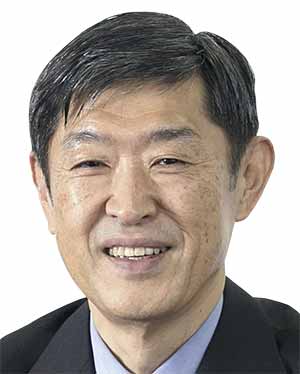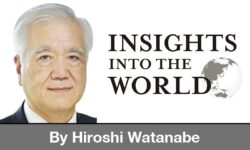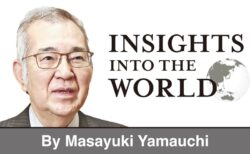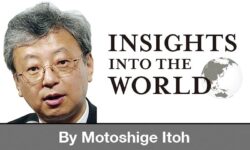18:57 JST, October 7, 2022
“The time has come to start text-based negotiations to reform the Security Council,” Prime Minister Fumio Kishida said in a speech before the U.N. General Assembly on Sept. 20, speaking more straightforwardly than his predecessors to show his determination to change the world body’s key decision-making organ. I don’t know the prime minister’s exact intentions, but reforming the Security Council is not only more important now than ever before, I think it’s actually possible to do it.
Russia’s invasion of Ukraine in February dealt a major blow to the United Nations. Despite being a permanent member of the Security Council, Russia brazenly trampled on the U.N. Charter, plunging the Security Council into dysfunction.
That said, it should be noted that the United Nations was powerless to begin with. The organization has neither armed forces nor economic power of its own. In a bid to stop Pyongyang’s nuclear development program, it has adopted a host of resolutions sanctioning North Korea, all to no avail.
Nevertheless, the United Nations continues to be a world body in which participating countries set forth international opinions by debating what is right — rather than making and implementing decisions. Such opinions help uphold the authority of the United Nations.
Limit veto power
One of the focal points of proposals for reforming the United Nations is how to limit the veto power of permanent Security Council members. This issue is long overdue. Earlier this year, the U.N. General Assembly adopted a Liechtenstein-proposed resolution requiring permanent council members to justify their use of the veto. Russia responded with a unilateral explanation of why it had earlier exercised its veto power, and the United Nations was unable to go any further on this issue.
Permanent council members’ right to use their veto is stipulated in Article 27 of the U.N. Charter, making it very difficult to restrict this privilege. As atrocities in Russian-occupied territories of Ukraine have come to light, campaigns for Security Council reforms are gathering momentum, but it is not easy to move forward. Moreover, it remains dubious that the United States would really agree to a proposal that would limit its own veto power on the Security Council.
Article 27 also establishes a rule that under certain provisions, even a permanent council member “shall abstain from voting” — meaning that it is not entitled to exercise its right to veto — while being “a party to a dispute.” However, countries like Russia tend to argue that they have been involved not in “disputes” but in “self-defense.”
Additionally, it may be conceivable to challenge Russia’s status as a permanent member of the Security Council. Article 23 of the U.N. Charter still refers to the Union of Soviet Socialist Republics — not the Russian Federation — as a permanent council member. It may also be possible to object to Russia’s recognition of itself as a successor state to the Soviet Union.
The U.N. General Assembly overwhelmingly adopted a resolution in March deploring Russia’s invasion of Ukraine, but another resolution calling for Russia in April to be suspended from the Human Rights Council was adopted with the backing of 93 countries — enough to fulfill the two-thirds majority required among those voting — versus 100 countries either voting against it, abstaining or choosing non-voting options.
Many of those voting against the April resolution were developing countries. They remember that the United States invaded Iraq in 2003 without the sanction of a Security Council resolution — and found no weapons of mass destruction there despite using their alleged presence as the justification for its offensive — wreaking havoc on the entire Middle East.
Furthermore, African countries remember the colonial rule by Britain, France and other European countries, and remember Soviet assistance during their campaigns for independence. In other words, developing countries have no great faith in the United States and other developed countries.
Kofi Annan initiative
Another focal point is the composition of the Security Council.
Japan has urged Security Council reforms for many years while expressing its readiness to become a permanent council member.
A chance, albeit slight, emerged in 2005 of going ahead with such reform. At the time, a high-level panel initiated by Kofi Annan, then secretary general of the United Nations, put forward two reform paths — model A and model B — with both envisaging a new 24-seat council, adding nine new seats to expand the existing council quota of 15 seats.
Model A provided for six new permanent members and three new non-permanent members. Model B called for the creation of a new category of eight long-term seats with four-year renewable terms — referred to as quasi-permanent members — and the addition of a two-year non-permanent seat. Annan called on the United Nations to choose one of them.
Japan formed the so-called Group of Four (G4) with Brazil, Germany and India and submitted to the General Assembly a draft resolution based on model A. Countries opposed to the possible expansion of permanent council seats established a rival group called Uniting for Consensus (UFC) and submitted a draft resolution of their own based on model B.
The G4 outperformed the UFC group in soliciting support among U.N. member countries, feeling confident of securing about 110 votes, close to the two-thirds majority of 128 votes that would have been necessary for its proposal to be approved. Ultimately, however, no relevant draft resolutions were submitted for a vote and the G4’s campaign for permanent council seats ended in failure.
Nowadays, there is no such momentum in the United Nations for reforming the Security Council. The Japanese economy has been stagnant, and its share of financial contributions to the United Nations shrank from 19.5% in 2005 to 8.0% at present, pushed by China (15.3%) into third place.
Ever since then, Japan has consistently advocated the adoption of the G4 proposal or the expansion of both permanent and non-permanent seats on the Security Council. However, Japan might soon lose its long-standing status as the top candidate for a new permanent council seat, as acknowledged by itself and others.
Considering its past efforts toward Security Council reforms, it may not be easy for Japan to change the position it has held. However, isn’t it advisable for Japan to freeze the G4 proposal and switch to a model B-based proposal now that the Security Council has stagnated due to the Ukrainian situation? For example, Takahiro Shinyo, who served as Japan’s ambassador to the United Nations, suggests this solution as an interim measure until 2045, when the United Nations marks its centenary.
Quasi-permanent members
This approach would let Japan join hands with some countries of the UFC group. Also, it might be possible to create common ground between Japan and African countries, because Africa has no definite candidate for a permanent seat on the Security Council, with many countries on that continent having preferred a rotating representation to permanent representation by any specific nation there.
Various proposals could be derived from model B. Should the United Nations agree to create eight council seats with four-year renewable terms, Japan would probably have a chance of being elected to the Security Council two times out of three votes, meaning it would be able to retain a council seat for eight years during a 12-year period. Japan has served as an elected two-year non-permanent council member quite often but has recently tended to stay on the sidelines for five to six years after being on the council. The alternative just described would be far better, as this could enable Japan to serve as a quasi-permanent member on the council.
If the Security Council is reformed on the basis of a model B formula, influential countries will have a greater chance to participate in the council. In January 2023, the new club of non-permanent council members will consist of Albania, Brazil, Ecuador, Gabon, Ghana, Japan, Malta, Mozambique, Switzerland and the United Arab Emirates. It cannot be denied that some of them have not been much involved in major issues in the world.
Once the Security Council is changed to have eight quasi-permanent members, countries like Japan, Brazil, Germany and India are likely to frequently take part in the premier U.N. organ. Some countries among UFC such as Italy, Mexico, South Korea and other important countries such as Australia, Indonesia and South Africa might get a quasi-permanent seat once in a while or probably once in three times.
This potentially new Security Council is likely to resemble an expanded Group of 20 forum with the addition of some midsize and small countries. But it will differ from the G20, as it will engage in discussion after discussion every week, every day, about political issues arising in the world.
In this likely new U.N. framework, Japan will find a new challenge to take on. Thus far, Japan has mostly prioritized its relationship with the United States and has also tackled international issues in the context of being a Group of Seven member. Once the new system is in place for the Security Council, Japan will inevitably have to give greater consideration to developing countries in the world.
But Japan is already a country capable of readily doing so. Japan is the G7 member state most trusted by developing countries. As such, this reform idea based on model B could be good for both Japan and the world. A Japan that gains the trust of developing countries can contribute to the strengthening of Japan-U.S. relations.
The Ukrainian issue is a crisis facing the world. But a crisis is also an opportunity to change things for the better. It is a great opportunity, indeed, to significantly reform the Security Council. I hope that Prime Minister Kishida will formulate a new Security Council reform proposal not bound by past developments and promote it to the rest of the world with a view to ensuring its early realization.

Shinichi Kitaoka
Kitaoka is a professor emeritus at the University of Tokyo, specializing in Japanese political and diplomatic history. His previous posts have included Japanese ambassador to the United Nations in 2004-06 and president of the Japan International Cooperation Agency in 2015-22.
Top Articles in Editorial & Columns
-

Riku-Ryu Pair Wins Gold Medal: Their Strong Bond Leads to Major Comeback Victory
-

40 Million Foreign Visitors to Japan: Urgent Measures Should Be Implemented to Tackle Overtourism
-

China Provoked Takaichi into Risky Move of Dissolving House of Representatives, But It’s a Gamble She Just Might Win
-

University of Tokyo Professor Arrested: Serious Lack of Ethical Sense, Failure of Institutional Governance
-

Policy Measures on Foreign Nationals: How Should Stricter Regulations and Coexistence Be Balanced?
JN ACCESS RANKING
-

Japan PM Takaichi’s Cabinet Resigns en Masse
-

Japan Institute to Use Domestic Commercial Optical Lattice Clock to Set Japan Standard Time
-

Israeli Ambassador to Japan Speaks about Japan’s Role in the Reconstruction of Gaza
-

Man Infected with Measles Reportedly Dined at Restaurant in Tokyo Station
-

Videos Plagiarized, Reposted with False Subtitles Claiming ‘Ryukyu Belongs to China’; Anti-China False Information Also Posted in Japan























